- Home
- Paula McLain
The Paris Wife: A Novel Page 2
The Paris Wife: A Novel Read online
Page 2
“Something homemade. Little Fever handed it to me in the kitchen. I’m not sure he didn’t cook it up in his shoe.”
Over against a long row of windows, Ernest began parading back and forth in a dark blue military cape someone had dug up. When he turned, the cape lifted and flared dramatically.
“That’s quite a costume,” I said.
“He’s a war hero, didn’t he tell you?”
I shook my head.
“I’m sure he’ll get to it eventually.” Her face didn’t give anything away, but her voice had an edge.
“He told me he used to pine for you.”
“Really?” There was the tone again. “He’s clearly over it now.”
I didn’t know what had come between these two old friends, but whatever it was, it was obviously complicated and well under wraps. I let it drop.
“I like to think I’m the kind of girl who’ll drink anything,” I said, “but maybe not from a shoe.”
“Right. Let’s hunt something up.” She smiled and flashed her green eyes at me, and became my Kate again, not grim at all, and off we went to get very drunk and very merry.
I found myself watching for Ernest the rest of the night, waiting for him to appear and stir things up, but he didn’t. He must have slipped away at some point. One by one nearly everyone did, so that by 3:00 a.m. the party had been reduced to dregs, with Little Fever as the tragic centerpiece. He was passed out on the davenport with long dark wool socks stretched over his face and his hat perched on his crossed feet.
“To bed, to bed,” Kate said with a yawn.
“Is that Shakespeare?”
“I don’t know. Is it?” She hiccuped, and then laughed. “I’m off to my own little hovel now. Will you be all right here?”
“Of course. Kenley’s made up a lovely room for me.” I walked her to the door, and as she sidled into her coat, we made a date for lunch the next day.
“You’ll have to tell me all about things at home. We haven’t had a moment to talk about your mother. It must have been awful for you, poor creatch.”
“Talking about it will only make me sad again,” I said. “But this is perfect. Thanks for begging me to come.”
“I worried you wouldn’t.”
“Me too. Fonnie said it was too soon.”
“Yes, well, she would say that. Your sister can be smart about some things, Hash, but about you, nearly never.”
I gave her a grateful smile and said good night. Kenley’s apartment was warrenlike and full of boarders, but he’d given me a large and very clean room, with a four-poster bed and a bureau. I changed into my nightdress then took down my hair and brushed it, sorting through the highlights of the evening. No matter how much fun I’d had with Kate or how good it was to see her after all these years, I had to admit that number one on my list of memorable events was dancing with Ernest Hemingway. I could still feel his brown eyes and his electric, electrifying energy—but what had his attentions meant? Was he babysitting me, as Kate’s old friend? Was he still gone on Kate? Was she in love with him? Would I even see him again?
My mind was suddenly such a hive of unanswerable questions that I had to smile at myself. Wasn’t this exactly what I had wanted coming to Chicago, something new to think about? I turned to face the mirror over the bureau. Hadley Richardson was still there, with her auburn waves and thin lips and pale round eyes—but there was something new, too, a glimmer of potential. It was just possible the sun was on its way. In the meantime, I would hum Nora Bayes and do my damnedest to make believe.
THREE
he next morning, I walked into the kitchen to find Ernest leaning lazily against the refrigerator, reading the morning newspaper and devouring half a loaf of bread.
“Did you sleep here?” I asked, unable to mask my surprise at seeing him.
“I’m boarding here. Just for a while, until things take off for me.”
“What do you mean to do?”
“Make literary history, I guess.”
“Gee,” I said, impressed all over again by his confidence and conviction. You couldn’t fake that. “What are you working on now?”
He pulled a face. “Now I’m writing trash copy for Firestone tires, but I mean to write important stories or a novel. Maybe a book of poetry.”
That threw me. “I thought poets were quiet and shrinking and afraid of sunlight,” I said, sitting down.
“Not this one.” He came over to join me at the table, turning his chair around to straddle it. “Who’s your favorite writer?”
“Henry James, I suppose. I seem to read him over and over.”
“Well, aren’t you sweetly square?”
“Am I? Who’s your favorite writer?”
“Ernest Hemingway.” He grinned. “Anyway, there’re lots of famous writers in Chicago. Kenley knows Sherwood Anderson. Heard of him?”
“Sure. He wrote Winesburg, Ohio.”
“That’s the one.”
“Well, with your nerve, you can probably do anything at all.”
He looked at me seriously, as if he were trying to gauge whether I was teasing or placating him. I wasn’t. “How do you take your coffee, Hasovitch?” he finally said.
“Hot,” I said, and he grinned a grin that began in his eyes and went everywhere at once. It was devastating.
When Kate arrived for our lunch date, Ernest and I were still in the kitchen talking away. I hadn’t yet changed out of my dressing gown, and there she was sharp and fresh in a red wool hat and coat.
“I’m sorry,” I said, “I won’t be a minute.”
“Take your time, you deserve a little indolence,” she said, but seemed impatient with me just the same.
I went off to dress, and when I came back, Kate was alone in the room.
“Where did Nesto run off to?”
“I haven’t the faintest,” Kate said. And then, because she clearly read disappointment in my face, “Should I have invited him along?”
“Don’t be silly. This is our day.”
In the end, we had a lovely afternoon. Out of all the girls in my class at Mary Institute, Kate was the boldest and most fearless, able to talk to anyone and make fun out of nothing at all. She was still that way and I felt bolder, too, walking along Michigan Avenue with her, and years younger. We had lunch at a restaurant across from the marble vastness of the Art Institute, where two regal lions presided over traffic and an ever-shifting sea of dark coats and hats. It was a chilly day, and after lunch, we huddled arm in arm along State Street, tucking into every interesting shop we came to. She tried to urge me to open up about things at home, but I didn’t want to lose my good mood. Instead, I got Kate talking about her summer up in Michigan, the fishing and swimming parties and general rambunctiousness. All of her stories seemed to involve rowboats and ukuleles, full moons and campfires and grog. I was desperately jealous.
“Why do you get all the young men?”
“They’re not mine, I’m just borrowing them.” She smiled. “It’s having brothers, I guess. And anyway, sometimes it’s a nuisance. I spent half the summer trying to encourage this one and discourage that one and all the signals got mixed and in the end no one even kissed anyone else. So there, see? Nothing to be envious of.”
“Is Carl Edgar still proposing to you regularly?”
“Ugh, I’m afraid so. Poor old Odgar. Sometimes I wonder what would happen if I actually said yes—as an experiment.”
“He’d fall over.”
“Or run away in terror, maybe. Some men seem to only want the girls beating a path in the other direction.”
“What about Ernest?”
“What about him?” Her eyes snapped to attention.
“Does he like his women on the run?”
“I wouldn’t know.”
“How young is he, anyway? Twenty-five?”
She smirked. “Twenty-one. A boy-o. I know you’re more sensible than that.”
“What do you mean?”
“I thought I saw so
me interest.” She gazed at me with intensity.
“I’m just bored,” I said. But I’d always been a terrible liar.
“How about a new hat instead?” she said, and pointed to something towering and feathery I couldn’t see myself standing beneath in a million years.
By the time we made it back to the apartment late that afternoon, the place was chock-full again. Kenley and his brother Bill, the youngest of the Smith clan, were trying to get together a card game. A fellow named Brummy was playing a ragtime tune on the piano while Ernest and another cohort, Don Wright, circled each other on the carpet in a spontaneous boxing match. They were stripped to the waist, bobbing and weaving with their fists up, while a group stood around egging them on. Everyone was laughing, and it looked like great fun until Ernest lit out with a right hook. Don managed to dodge most of it, and the match went on good-naturedly, but I’d seen the killer look on Ernest’s face when he threw the punch and knew it was all very serious to him. He wanted to win.
Kate seemed unfazed by the boxing and everything else going on in the apartment. Apparently the place was always this crazy in the evenings, a good-time Grand Central. Prohibition had been under way for the better part of a year, and that “noble experiment” had spurred the popping up, nearly overnight, of speakeasies in cities everywhere. There were supposed to be thousands of these in Chicago alone, but who needed a speakeasy when Kenley, like many resourceful young men, had stockpiled enough hooch to pickle a herd of elephants? That night, there was plenty of open wine in the kitchen, so Kate and I had some of that, and then some more. As dusk fell, purpling and softening the room, I found myself on the davenport squeezed in between Ernest and Horney while they talked over me in Pig Latin. I couldn’t stop collapsing into fits of giggles—and when was the last time I giggled anyway? It was surprisingly, intoxicatingly easy now.
When Horney got up to join Kate on the improvised dance floor, Ernest turned to me and said, “I’ve been thinking all day about how to ask you something.”
“Really?” I didn’t know if I was more surprised or flattered.
He nodded. “Would you want to read something of mine? It’s not a story yet, more like a sketch.” He tucked his chin nervously and I almost laughed with relief. Ernest Hemingway was nervous and I wasn’t, suddenly. Not in the least.
“Sure,” I said. “But I’m no literary critic. I’m not sure I can help you.”
“It’s all right. I’d just like to get your take on it.”
“Okay, then. Yes,” I said.
“I’ll be right back,” he said, and bolted halfway across the carpet before turning around. “Don’t go away, all right?”
“Where would I go?”
“You’d be surprised,” he said, mysteriously, and then ran off to fetch the pages.
Essentially, the story wasn’t a story, he was right. It was a darkly funny sketch called “Wolves and Donuts” set in an Italian restaurant on Wabash Avenue. But even though the piece was unfinished, the voice was acid sharp and hilarious. We went into the kitchen for better light and a little quiet, and as I read, Ernest paced the room, his arms swinging and pawing the air as he waited for me to answer the question he couldn’t bring himself to ask: Is it good?
When I’d turned the last page, he sat in the chair opposite me with an expectant look.
“You’re very talented,” I said, meeting his eyes. “I’ve probably spent too much time on Henry James. Your stuff isn’t that.”
“No.”
“I’m not sure I get it completely, but I can tell you’re a writer. Whatever that thing is, you have it.”
“God that’s good to hear. Sometimes I think all I really need is one person telling me that I’m not knocking my fool head against the bricks. That I have a shot at it.”
“You do. Even I can see that.”
He looked at me intently, boring a small hole with those eyes. “I like you, you know. You’re a good clear sort.”
“I like you, too,” I said back, and it struck me how comfortable I felt with him, as if we were old friends or had already done this many times over, him handing me pages with his heart on his sleeve—he couldn’t pretend this work didn’t mean everything to him—me reading his words, quietly amazed by what he could do.
“Will you let me take you to dinner?” he said.
“Now?”
“What’s stopping us?”
Kate, I thought. Kate and Kenley and the whole drunken throng in the living room.
“No one will even notice we’re gone,” he said, reading my hesitation.
“All right,” I said, but slunk off like a thief to get my coat anyway. I wanted to go with him. I was dying to go, but he was wrong about no one noticing. As we ducked out the door together, I felt Kate’s green eyes flashing hotly over my back and heard her silent shout, Hadley, be sensible!
I was tired of being sensible. I didn’t turn around.
It was a sheer pleasure to walk the chilly Chicago streets with Ernest at my side, talking and talking, his cheeks flushed, his eyes beaming. We went to a Greek restaurant on Jefferson Street where we had roasted lamb and a cucumber salad with lemon and olives.
“I suppose it’s embarrassing, but I’ve never had olives before,” I said when the waiter arrived with our order.
“That should be illegal. Here, open.”
He put the olive on my tongue, and as I closed my mouth around it, oily and warm with salt, I found myself flushing from the deliciousness but also the intimacy, his fork in my mouth. It was the most sensual thing that had happened to me in ages.
“Well?” he prodded.
“I love it,” I said. “Though it’s a little dangerous, isn’t it?”
He smiled and looked at me appreciatively. “A little, yes.” And then he ate a dozen himself, one after the other.
After dinner we walked under the elevated train and headed toward the Municipal Pier. The whole time he talked fast about his plans, all the things he wanted for himself, the poems, stories, and sketches he was burning to write. I’d never met anyone so vibrant or alive. He moved like light. He never stopped moving—or thinking, or dreaming apparently.
When we reached the pier, we walked along it all the way out to the end of the streetcar line.
“Did you know they had barracks and Red Cross units out here during the war? I worked for the Red Cross over in Italy, as an ambulance driver.”
“The war seems very far away now, doesn’t it?”
“Sometimes.” A line of worry or doubt appeared on his forehead. “What were you doing in those days?”
“Hiding out, mostly. I sorted books in the basement of the public library. I’m told they eventually went to soldiers overseas.”
“That’s funny. I hand-delivered those books. Chocolate bars, too. Letters, cigarettes, candy. We had a canteen set up, but sometimes I went out to the line at night, on a bicycle. Can you picture it?”
“I can. It’s a wobbly red bicycle, right?”
“The boy was wobbly too after he got blown all to hell.”
I stopped walking. “Oh, Ernest, I’m sorry. I didn’t know.”
“Don’t worry. I was a hero for a day or two.” He leaned against the railing and looked out at the lake, gray on gray, with just a ghost of white. “You know what I think about now?”
I shook my head.
“Silkworms. I spent a night in San Pedro Norello, a village on the front. Horney was there—that’s where I met him—and our cots were set up on the floor of this building, right? It was a silkworm factory. They were up over our heads, in the eaves, chewing away in racks full of mulberry leaves. That’s the only thing you could hear. No shell fire, no nothing. It was terrible.”
“I’ve never thought of silkworms that way. Maybe I’ve never thought of silkworms at all, but I can hear them now, the way you did.”
“Sometimes when I can’t sleep, I think I hear them chewing. I have to get up and turn the lights on and look up at the ceiling.”
“Are they ever there?” I smiled, trying to lighten the mood.
“Not yet.”
We headed away from the brightly lit shops and turned toward home—and I was struck by how rare it was to hear a near stranger share something so essential about himself. He told it beautifully, too, with real feeling. I think I was a little dumbstruck. Just who was this Ernest Hemingway?
Suddenly he stopped walking and faced me on the sidewalk. “Listen, Hash. You’re not going to run off on me are you?”
“I’m not much of an athlete,” I said.
“I like your spine. Did I tell you that?”
“You did.”
“I like it more than that, then,” he said. Then he gave me a winning smile and started to walk again, tucking my gloved hand under his arm.
The next morning Kate came into my room without knocking. I wasn’t even dressed yet.
“I waited past midnight. Where were you?”
“I’m sorry. Ernest invited me to dinner. I wasn’t sure how I could say no.”
“No is the easiest word there is. Children learn to talk by saying no.”
I pulled my robe more tightly around my waist and sat down on the bed. “All right. I didn’t want to say no. It was just dinner, Kate. There’s no harm done.”
“Of course,” she said, obviously still flustered. “I just feel protective of you and don’t want to see you get tangled up in something awful.”
“Why awful? He doesn’t seem like a bad fellow.”
“He’s not bad, exactly.” I could see she was trying to choose her words carefully. “He’s just young. He likes women—all women, apparently. And I see you throwing yourself at him, blindly trusting him, and it worries me.”
“I’m not throwing myself at anyone,” I said, suddenly angry. “I had dinner with the man. Honestly, Kate.”
“You’re right, you’re right,” she said. “I’m getting carried away.” She sat down beside me on the bed and reached for my hand. “Forget I said anything, okay? You’re a levelheaded girl. You’ll know what to do.”
“Nothing happened.”

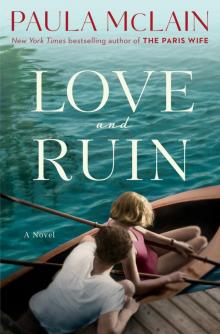 Love and Ruin
Love and Ruin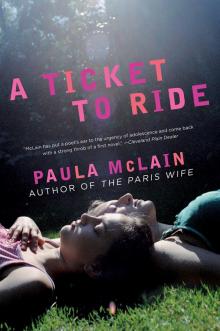 A Ticket to Ride
A Ticket to Ride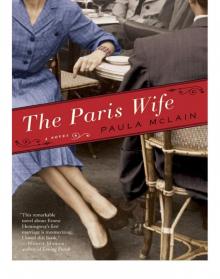 The Paris Wife
The Paris Wife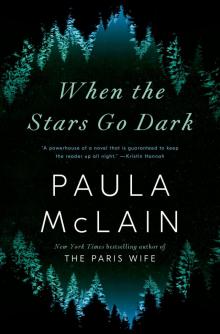 When the Stars Go Dark: A Novel
When the Stars Go Dark: A Novel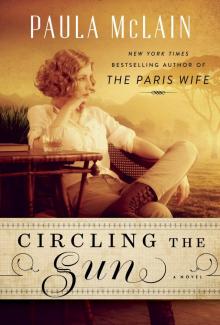 Circling the Sun
Circling the Sun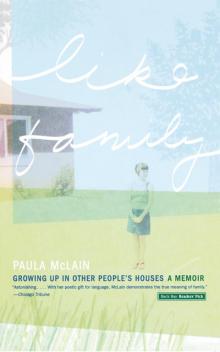 Like Family
Like Family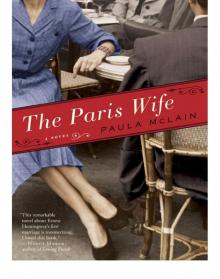 The Paris Wife: A Novel
The Paris Wife: A Novel